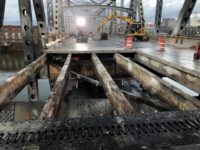As the Kentucky legislature is set to return March 26 from a weeklong pause amid the COVID-19 outbreak, the House will take up a potentially controversial bill that would raise the state’s fuel taxes on cars and trucks, and increase registration fees for conventional and electric-powered vehicles.
The proposal comes after the Kentucky’s House of Representatives passed a two-year, $4.7-billion statewide transportation spending measure, which now awaits action in the state Senate. In addition to funding hundreds of projects in a separately passed state Road Plan, the bill allocates $80 million a year to bridge repair and replacement and $8 million to installation of guard rails. Budgets for aviation, railroad crossings and riverport projects would also see increases.
Kentucky Association of Highway Contractors Executive Director M. Chad LaRue says the state’s transportation funding gap has yet to fully recover from a 2014 drop in fuel prices, creating an estimated $500-million statewide maintenance backlog.
“At the same time, we have seen increased transportation cabinet costs for pension obligations, increased diversion from the road fund, the exhausting of our ability to use toll credits, and the impacts of inflation on the buying power of existing funding,” LaRue adds.
The bipartisan bill introduced in the House would add 8.6 cents per gallon to the current fuel tax for passenger vehicles, bringing the total amount to 34.6 cents. Commercial trucks with two or more axles would pay an additional 7 cents. As well, vehicle owners would have to pay a highway preservation fee at the initial vehicle registration, and again each year. Owners of electric vehicles would pay an initial $200 registration fee, plus another $200 each year.
LaRue admits that while some legislators might balk at increasing fees with a coronavirus-influenced recession looming, he considers the proposal “a reasonable approach to a funding model to fill the gap between the current way we generate revenue with the motor fuels tax, and possible future ways to generate revenues, such as user fees and mileage-based fees.”
Calling the bill’s prospects uncertain at this point, LaRue believes a majority of state legislators and the administration appreciates the need for increased transportation funding and the role of infrastructure in the state’s economy. So far, no projects have been scaled back, he says, and contractors are following the COVID-19 pandemic guidelines being provided at the state and federal levels.
Still, he adds, “There is certainly nervousness in the industry because of the uncertainty related with this pandemic.”




Post a comment to this article
Report Abusive Comment